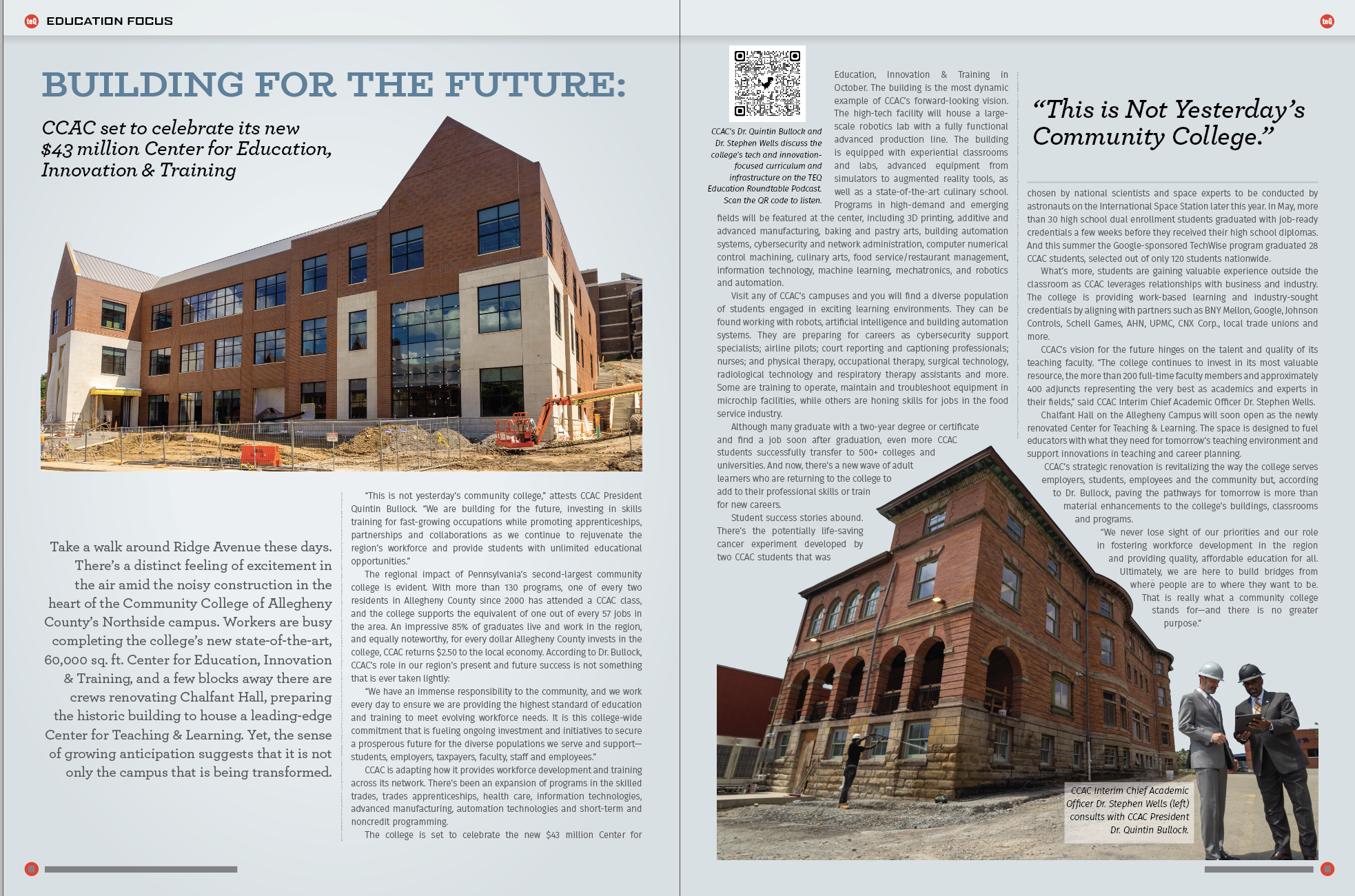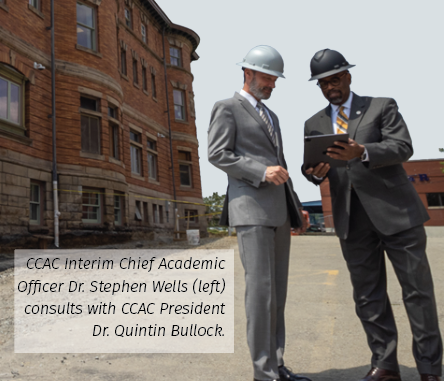CCAC is Building for the Future Workforce

Take a walk around Ridge Avenue these days. There’s a distinct feeling of excitement in the air amid the noisy construction in the heart of the Community College of Allegheny County’s Northside campus. Workers are busy completing the college’s new state-of-the-art, 60,000 sq. ft. Center for Education, Innovation & Training, and a few blocks away there are crews renovating Chalfant Hall, preparing the historic building to house a leading-edge Center for Teaching & Learning. Yet, the sense of growing anticipation suggests that it is not only the campus that is being transformed.
“This is not yesterday’s community college,” attests CCAC President Quintin Bullock. “We are building for the future, investing in skills training for fast-growing occupations while promoting apprenticeships, partnerships and collaborations as we continue to rejuvenate the region’s workforce and provide students with unlimited educational opportunities.”
The regional impact of Pennsylvania’s second-largest community college is evident. With more than 130 programs, one of every two residents in Allegheny County since 2000 has attended a CCAC class, and the college supports the equivalent of one out of every 57 jobs in the area. An impressive 85% of graduates live and work in the region, and equally noteworthy, for every dollar Allegheny County invests in the college, CCAC returns $2.50 to the local economy. According to Dr. Bullock, CCAC’s role in our region’s present and future success is not something that is ever taken lightly:
“We have an immense responsibility to the community, and we work every day to ensure we are providing the highest standard of education and training to meet evolving workforce needs. It is this college-wide commitment that is fueling ongoing investment and initiatives to secure a prosperous future for the diverse populations we serve and support—students, employers, taxpayers, faculty, staff and employees.”
CCAC is adapting how it provides workforce development and training across its network. There’s been an expansion of programs in the skilled trades, trades apprenticeships, health care, information technologies, advanced manufacturing, automation technologies and short-term and noncredit programming.
The college is set to celebrate the new $43 million Center for Education, Innovation & Training in October. The building is the most dynamic example of CCAC’s forward-looking vision. The high-tech facility will house a large-scale robotics lab with a fully functional advanced production line. The building is equipped with experiential classrooms and labs, advanced equipment from simulators to augmented reality tools, as well as a state-of-the-art culinary school. Programs in high-demand and emerging fields will be featured at the center, including 3D printing, additive and advanced manufacturing, baking and pastry arts, building automation systems, cybersecurity and network administration, computer numerical control machining, culinary arts, food service/restaurant management, information technology, machine learning, mechatronics, and robotics and automation.
Visit any of CCAC’s campuses and you will find a diverse population of students engaged in exciting learning environments. They can be found working with robots, artificial intelligence and building automation systems. They are preparing for careers as cybersecurity support specialists; airline pilots; court reporting and captioning professionals; nurses; and physical therapy, occupational therapy, surgical technology, radiological technology and respiratory therapy assistants and more. Some are training to operate, maintain and troubleshoot equipment in microchip facilities, while others are honing skills for jobs in the food service industry.
Although many graduate with a two-year degree or certificate and find a job soon after graduation, even more CCAC students successfully transfer to 500+ colleges and universities. And now, there’s a new wave of adult learners who are returning to the college to add to their professional skills or train for new careers.
 Student success stories abound. There’s the potentially life-saving cancer experiment developed by two CCAC students that was chosen by national scientists and space experts to be conducted by astronauts on the International Space Station later this year. In May, more than 30 high school dual enrollment students graduated with job-ready credentials a few weeks before they received their high school diplomas. And this summer the Google-sponsored TechWise program graduated 28 CCAC students, selected out of only 120 students nationwide.
Student success stories abound. There’s the potentially life-saving cancer experiment developed by two CCAC students that was chosen by national scientists and space experts to be conducted by astronauts on the International Space Station later this year. In May, more than 30 high school dual enrollment students graduated with job-ready credentials a few weeks before they received their high school diplomas. And this summer the Google-sponsored TechWise program graduated 28 CCAC students, selected out of only 120 students nationwide.
What’s more, students are gaining valuable experience outside the classroom as CCAC leverages relationships with business and industry. The college is providing work-based learning and industry-sought credentials by aligning with partners such as BNY Mellon, Google, Johnson Controls, Schell Games, AHN, UPMC, CNX Corp., local trade unions and more.
CCAC’s vision for the future hinges on the talent and quality of its teaching faculty. “The college continues to invest in its most valuable resource, the more than 200 full-time faculty members and approximately 400 adjuncts representing the very best as academics and experts in their fields,” said CCAC Interim Chief Academic Officer Dr. Stephen Wells.
Chalfant Hall on the Allegheny Campus will soon open as the newly renovated Center for Teaching & Learning. The space is designed to fuel educators with what they need for tomorrow’s teaching environment and support innovations in teaching and career planning.
CCAC’s strategic renovation is revitalizing the way the college serves employers, students, employees and the community but, according to Dr. Bullock, paving the pathways for tomorrow is more than material enhancements to the college’s buildings, classrooms and programs.
“We never lose sight of our priorities and our role in fostering workforce development in the region and providing quality, affordable education for all. Ultimately, we are here to build bridges from where people are to where they want to be. That is really what a community college stands for—and there is no greater purpose.”
Listen to the TEQ Education Roundtable Podcast featuring CCAC's Drs. Quintin Bullock and Stephen Wells.
.png)